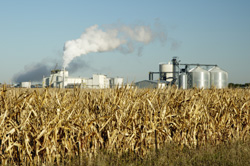Modifying yeasts to increase ethanol production
It is anticipated that biofuels will play an important role in Europe's quest to reduce carbon emissions. Ethanol is a promising biofuel, especially when produced from the fermentation of lignocellulosic biomass, such as agricultural and wood residues. The TIME project received funding from the Fifth Framework Programme to advance the state-of-the-art in this field. Scientists with the Nedalco Research Laboratory contributed by optimising the strains of yeast used in the fermentation process. Techniques were developed to enable hydrolysis even in the presence of toxic substances. The effect of pretreating the lignocellulosic material, for example with steam, was also investigated. The capacity of more than 20 different strains of yeast to produce ethanol was assessed. In general, the industrial and genetically modified strains outperformed their laboratory counterparts, especially with respect to tolerance to toxins. Finally, the Nedalco Research Laboratory discovered that it could significantly enhance ethanol production through yeast mutagenesis. In fact, they managed to nearly double the rate of ethanol production and boost yields by as much as 50%. These results will be exploited to reduce the energy consumption and production costs associated with ethanol, making it an even more attractive biofuel option. The new knowledge acquired by the Nedalco Research Laboratory and its TIME partners is being shared with the academic community through conference presentations and scientific publications.







